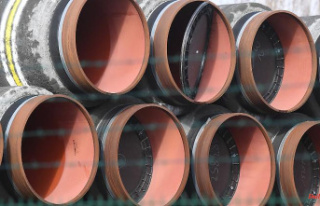Zalando was one of the winners of the Corona stock boom. But now the course knows only one direction: down. What's going on there?
The stock markets have been going downhill for weeks. At the forefront: Zalando. The online fashion retailer's shares have temporarily collapsed by up to 18 percent to EUR 20.94 today, which is less than when it went public in 2014. Since the beginning of the year, the share has lost around 70 percent in value. "Online was nice during the pandemic, now the valuation is more realistic and consumption is suffering," said a stock trader.
During the Corona stock boom, the course had literally gone through the roof. Zalando benefited from the flourishing online trade, many people bought their clothes online because the shops were closed. The share price reached a record high of EUR 105.90 last summer, and the company was valued at almost EUR 28 billion. It is now just under 6 billion euros.
There are several reasons for this. Customers are now going to fashion stores more often again. In addition, high inflation means lower sales. Because many people have to hold back when shopping because they now have less money at their disposal.
As a result, the Berlin Dax group slashed its forecasts for this year. The management announced that in the best case scenario, sales in 2022 should only increase by three percent to 10.7 billion euros. However, the proceeds could also stagnate at 10.4 billion euros. For classification: At the beginning of May, the Management Board had still assumed growth of up to 19 percent.
A broker said that Zalando's new outlook was much worse than feared. "Although the warning was generally expected, its scope is much larger than expected," said JPMorgan analyst Georgina Johanan. Because of the gloomy prospects for consumption, she advises against using the current price setback for an entry.
It is now assumed that macroeconomic challenges will last longer and be more intense than initially assumed, according to Zalando. Translated, this means: inflation and slack consumption are likely to continue to affect the company. In addition, the Kremlin's gas restrictions could plunge Germany into a recession.
This development had already become apparent when the business figures for the first quarter were presented in May. At the start of the year, the company had to accept a drop in sales for the first time since it was founded. It was to be expected that the level "from the exceptionally strong quarter of the previous year" would not be maintained after the pandemic, said co-boss Robert Gentz, adding with a view to the high inflation and the war in Ukraine instigated by Russia: "The main issue people just aren't into buying fashion." Nevertheless, he expected a "significant acceleration of business in the second half of the year".
However, that was too optimistic. Zalando is now reacting, for example, with savings in marketing and the introduction of a minimum order value in other countries. In addition, the costs incurred for orders should be passed on to the logistics partners to a greater extent.












